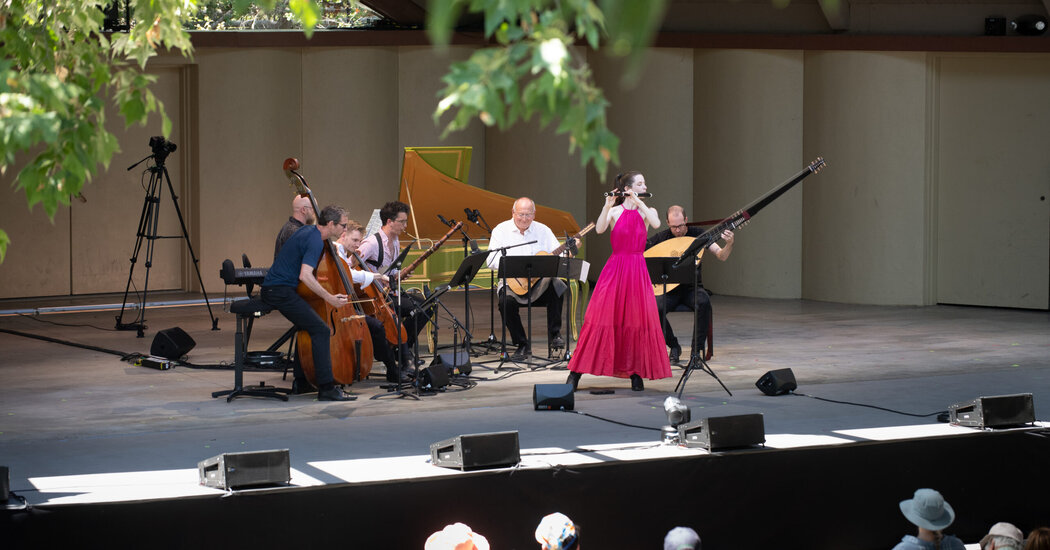
OJAI, Calif. — “We are multiple, fractious and free,” a trio of voices sang with mock formality here on Saturday evening. “We call you to the table of a loving family.”
As a mission statement for the 2022 Ojai Music Festival, you could hardly do better. Each year this four-day event is programmed by a different music director — it could be a violinist, a conductor, a composer — who leaves a stamp on the offerings.
This time, the stamp was collective. This fertile, post-bohemian valley north of Los Angeles was swarmed last week by the fast-rising American Modern Opera Company — known as AMOC, pronounced as in running … well, you know.
Many in the arts these days talk a big game about interdisciplinary collaboration, but few walk the walk like AMOC, which counts composers, choreographers, dancers, singers, instrumentalists and a stage director among its 17 core members.
At its best — whether performing a zany new pop musical about the fall of Rome; a witty dance theater piece about rehearsing; or the intense, expansive music of Julius Eastman — AMOC is a party, a communal happening, a family dinner.
Pursuing a vision of opera as free-floating, lightly staged assemblages more than traditional score-and-libretto productions, AMOC works in shifting configurations. Many of those were showcased here last weekend in a range of spaces — inside and out, under the broiling midday sun and, more happily, the mild stars.
How tightknit is this group? As Ojai proved, enough to confidently execute complicated, sprawling structured improvisations by George E. Lewis (skittish) and Roscoe Mitchell (luminous) — at 8 in the morning.
THERE IS NOTHING IN music quite like Ojai, now three-quarters of a century old, with that packed morning-to-night-schedule, its variety of spaces and the stalwart curiosity of its audience. Led by Ara Guzelimian with a steady hand, the festival is Southern California relaxed — T-shirts and shorts, maybe a hoodie at night — but the repertory tends rigorous and recondite.
Even the warning that a concert is about to begin isn’t the usual docile bells, but a spreading roar of electronics from “Répons” by Pierre Boulez, a tutelary spirit here for decades.
Hypercomplex Boulezian modernism wasn’t on offer this year: The composer Matthew Aucoin, who founded AMOC in 2017 with the director Zack Winokur, wrote witheringly in The New York Review not long ago about the “supersaturated sameness” of Boulez’s music.
Then what was the prevailing style? In keeping with the openness of many young artists now, it was broad. Adaptations of folk music were in — including spirituals, the violinist Keir GoGwilt’s feathery fiddling renditions of Scottish ballads, and Aucoin’s hoedown “Shaker Dance.”
So was play with texts, including explorations of how singing and spoken word could share space in a musical context. But the biggest new pieces in this vein — Carolyn Chen’s collaboration with the poet Divya Victor, and Anthony Cheung’s “The Echoing of Tenses” — would benefit from prudent trims.
VARIOUS FACETS AND MOODS of Minimalism and its legacy were represented, including Philip Glass songs and, performed in the middle of Libbey Park, part of Tom Johnson’s 1979 solo “Nine Bells.” That featured the percussionist Jonny Allen jogging a precise route around the bells, hitting a gradually evolving riff — sometimes with delicacy, sometimes with violence.
To roiling music, Frederic Rzewski’s “Coming Together” (1971) harps on its text, a letter written by an Attica inmate who died in the uprising there, spoken with ironic bravado here by the bass-baritone Davóne Tines, the weekend’s most valuable player. A very different definition of the minimal: On Sunday morning, there was a rare opportunity to hear Hans Otte’s “The Book of Sounds,” a solo piano epic from the late 1970s and early ’80s, played by Conor Hanick with control and sensitivity.
The material here is deceptively simple: undulating lines, sometimes slowed to expansive chords and sometimes sped to a Glass-style arpeggiated flood. The harmonies subtly thicken and thin; the emotions remain ambiguous, the mood meditative.
The birds in the trees around the outdoor Libbey Bowl, the festival’s main space, added flickers, and acoustical illusions began to emerge from Otte’s trance; I could have sworn, near the end, that a mellow horn call was coming out of the piano textures. And on Saturday morning, rotating your head, as the cellist Jay Campbell suggested, brought out different pitches from the densely vibrating mix when he played Catherine Lamb’s “Cross/Collapse” (2010), his long drones hovering beside oscillating electronic tones.
AS GOOD AS ANYTHING this weekend was Andrew McIntosh’s “Little Jimmy” (2020), a quartet for two pianists and two percussionists that takes its name from a campsite in the San Gabriel Mountains. McIntosh made field recordings there a few months before it was devastated by a fire, and the resulting piece is a subtly rending reflection on the climate crisis, and what can be salvaged from ashes.
Restrained in his deployment of the recordings, McIntosh conjures an enigmatic, shadowy, quietly colorful world, sometimes bone-dry, sometimes softly shimmering. Piano strings are manipulated with fishing line for a metallic whine; bowing a vibraphone while a tubular bell is gently struck ends up sounding like how a shiver feels.
Attending Ojai this year, you might have been convinced that no music was written from about 1800 to 1970. The early-to-contemporary pipeline was in full swing here, with period and modern instruments mixing freely. Composers including Cassandra Miller, Michael Hersch, Kate Soper and Reiko Füting played with antique styles and fragments; Ruckus, a small Baroque band that shares members with AMOC, was a guest throughout the weekend, joining the flutist Emi Ferguson, her tone silky and tender and her ghostly multiphonics astonishing, in spirited Bach on Saturday morning.
Some of the weekend’s collaborations were more sincere than successful. It wasn’t clear what sudden, stretching choreography added to Allen’s already entrancing movement in “Nine Bells” or in Iannis Xenakis’s “Rebonds.” There was a whiff of trying-it-out college theater in Chen’s “How to Fall Apart” (a disco ball swings; a croissant is thrown) and in the dancer Or Schraiber’s “The Cello Player” (a musician carries an armoire on his back; a metronome solemnly ticks).
But “Open Rehearsal,” directed by the choreographer and dancer Bobbi Jene Smith, felt more nuanced. An outgrowth of Smith’s recent work “Broken Theater,” it is a wry, sometimes uproarious and poignant metatheatrical riff on the process of creation.
The performers inhabit archetypes — the moody director, the horny actor, the warring brothers — in charged, wild episodes that suggest auditioning, going through material and putting it onstage. Life and art blur, as do traditional roles: Instrumentalists dance; dancers sing.
The piece had an important absence: The superb soprano Julia Bullock tested positive for Covid just before flying to California. She would have been featured throughout the weekend, and her staged version of Messiaen’s “Harawi” promised to be a highlight.
IT SPEAKS TO AMOC’S agility and the depth of its bench that it was able to replace “Harawi” with Tines’s “Recital No. 1: Mass,” a blending of soul songs and spirituals with Caroline Shaw’s graceful settings of the words of the Latin Ordinary. (Ariadne Greif valiantly stepped in for Bullock in other pieces.)
Though he sounded tired and muddy in two Bach arias, Tines was radiantly powerful in “Mass,” his voice careening from airy to rock-solid in Moses Hogan’s “Give Me Jesus.” “Mass” charts a path from being lost to being healed — here, by way of Tines’s improvised, preacher-style account of what he described as a racially charged comment from an audience member the night before.
He was also the magnetic center in a Friday morning performance of works by Eastman, the once forgotten and now acclaimed gay, Black composer, that conveyed this music’s mixture of sternness and exhilaration, its ingenuity and malleability.
Tines was commanding in the chanted exhortations of “Prelude to the Holy Presence of Joan d’Arc.” “Gay Guerrilla,” originally done on four pounding pianos, was here more kaleidoscopic with a more varied ensemble; its quotation of the hymn “A Mighty Fortress Is Our God,” usually played, took on new potency when Tines belted it. Starting out as a peppy jam, “Stay On It” moved toward a forceful march before drifting into quiet, lilting elegy.
“We call you to the table of a loving family” worked as metaphor — but for AMOC, it was also literal, evoking the meals that are a fixture of the group’s annual Vermont retreats. The line was sung in Aucoin’s “Family Dinner,” given its premiere on Saturday. Billed as a set of mini-concertos evoking collective energy and individual talents, the piece felt like an awkwardly paced work in progress, its mixture of instrumental passages, spoken text and poetry settings still finding its form, its ending an abrupt anticlimax.
The more compelling family dinner was “Rome Is Falling,” Doug Balliett’s brainily bubble-gum, lovably shaggy rundown of ancient history — and its obvious contemporary parallels — reminiscent of “Bloody Bloody Andrew Jackson” and “Hamilton.” The performers were grinning as much as the audience was.
And, for family dessert, a reprise of “Stay On It” closed the festival early Sunday evening. Presided over by Tines, it was a sweetly dancing, full-ensemble jamboree — like both Ojai and AMOC, multiple, fractious and free.




